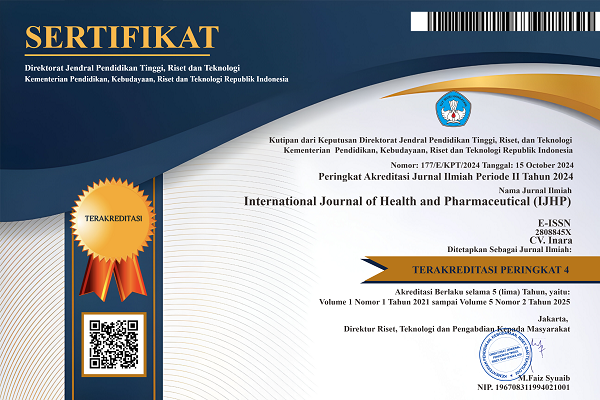Impact Of Technology And Information After A Period Of Pademi For Education And Health In Indonesia
DOI:
https://doi.org/10.51601/ijhp.v3i1.122Abstract
Technology has also influenced various sectors, an example of technological development is the
emergence of application software that makes it easier for companies.But not only that, one type
of form of technology that is growing rapidly in the era of pademi is information and
Communication Technology in the field of Education. With the existence of social media, the
younger generation takes advantage of this to take part and influence the community by
showing their intelligence to set an example to the community through social media. One of the
things that need to be considered in creating a competitive advantage for culinary, fashion,
music, tourism industry players in the pademi era is Database Building and Management,
namely the application of a platform that includes WhatsApp Business and email lists as a data
container for potential repeat purchases by consumers. Since the pandemic conditions,
consumers prefer to buy food, clothing, household items dal other delivery rather than come on
the spot. Adaptation for behavior towards the new normal by developing strategies such as
social distancing, health consider, cashless, less contact must also be implemented by existing
businesses. In the context of business, technology can provide changes so as to create a new
point of view in business known as digital marketing or internet marketing that utilizes the
internet as a market medium. Conventional businesses are more concerned with purchases
made by consumers. However, with a circular business model, how consumers can obtain goods
and services is more important. Conventional business success focuses more on the material
benefits gained from the sale of goods or services. They are result oriented. However, circular
businesses are more concerned with how they can create a balance between environmental,
social, and profit aspects.
Downloads
References
Abdullah Sani, R. (2013). Inovasi pembelajaran. Jakarta: Bumi Aksara.
Afriyanti, N., & Rahmiati, C. (2021). Faktor-Faktor yang Mempengaruhi Kepatuhan Masyarakat Terhadap
Protokol Kesehatan COVID-19. 001, 113– 124.
Agustiana, L. E. (2020). Pengaruh Wabah COVID-19 Terhadap Tingkat Pengangguran Terbuka Pada Sektor
Terdampak Di Indonesia. Jurnal Ilmu Manajemen Terapan, 1(6), 546–556. https://doi.org/10.31933/JIMT
Arikunto, Suharsimi. (2019). Prosedur Penelitian Suatu Pendekatan Praktik. Jakarta: Rineka Cipta.
A.R Tilaar. 2012, Pengembangan Kreativitas dan Enttrepreneurship dalam Pendidikan Nasional. Jakarta,
Kompas.
Arifin, Zainal. (2011). Evaluasi Pembelajaran. Bandung: Remaja Rosdakarya.
Departemen Kesehatan Republik Indonesia. (2009). Pedoman Pengendalian Penyakit Infeksi Saluran Pernafasan
Akut, Direktorat Jendral Pengendalian Penyakit dan Penyehatan Lingkungan. Jakarta: Departemen Kesehatan RI
Indrawan, R, Yuniawati, P.(2014). Metode Penelitian. Bandung: PT. Refita Aditama.
Indayani, S., & Hartono, B. (2020). Analisis Pengangguran dan Pertumbuhan Ekonomi sebagai Akibat Pandemi
Covid-19. Jurnal Perspektif, 18(2), 201–208. https://doi.org/DOI: https://doi.org/10.31294/jp.v17i2
Keraf, G. (2004), Argumentsi dan Narasi, Jakarta : Gramedia
Percival, F. & Hendry E. (1988). Teknologi Pendidikan. Jakarta , Erlangga.
Rohani, A. (1997). Media Intruksional Edukatif, Jakarta : Pt Rineka Cipta.
Syah, Muhibbin. (2006) Pisikologi Belajar, Jakarta : Rajawali Pers.
Pavlova, M. 2009. Technology and vocational education for sustainable development: Empowering individuals
for the future. Australia: Springer.
Miarso, Yusufhadi. (2007). Menyemai Benih Teknologi Pendidikan.Jakarta : Kencana.
Munir.(2008). Kurikulum Berbasis Teknologi Informasi dan Komunikasi. Bandung: Alfabeta
Notoatmodjo, S. (2007). Promosi Kesehatan dan Ilmu Perilaku. Jakarta: Rineka Cipta.
Oemar, Hamalik. (2011). Proses Belajar Mengajar. Jakarta: Bumi Aksara
International Journal of Health and Pharmaceutical
Rivai, Ahmad. (2009). Teknologi Pengajaran. Bandung: Sinar Baru Algensindo.
Roblyer. (2009). Integrating Educational Technology Into Teaching. USA: Pearson Education, Inc.
Rusman.(2011). Model-Model Pembelajaran. Jakarta: Rajawali Pres.
Holt, David K., Management Principle and Practices, Prentice Hall Inc. Englewood Clifs., N.J. 1993.
Mujiarto, dan Aliaras Wahid, 2006, Membangun karakter dan Kepribadian Kewirausahaan, Jakarta Barat, Graha
Ilmu.
Sanjaya, Wina. (2015). Penelitian Pendidikan. Jakarta: Prenada Media Group.
Suryana, Yuyus dan Kartib Bayu, 2010, Pendekatan Karakteristik Wirausaha Sukses, Jakarta, Kharisma Utama
Putra.
Mulyono. (2009). Manajemen Administrasi & Organisasi Pendidikan. Yogyakarta: Ar-Ruzz Media.
Purwanto, M. N. (2006). Psikologi Pendidikan. Bandung: Remaja Rosdakarya
Sagala. (2008). Konsep dan Makna Pembelajaran. Bandung. Alfabeta
Sardiman. (2007). Interaksi dan Motivasi belajar Mengajar: Bandung. Rajawali Pers
Sugiyono. (2018). Metode Penelitian Kuantitatif, Kualitatif, dan R&D. Bandung: Alfabeta.
Downloads
Published
How to Cite
Issue
Section
License
Copyright (c) 2022 Aulia Hervi Anggraini, Haura Karlina, Ratna Utami Wijayanti, Wahyu Wismanto Hadi

This work is licensed under a Creative Commons Attribution-NonCommercial 4.0 International License.





























